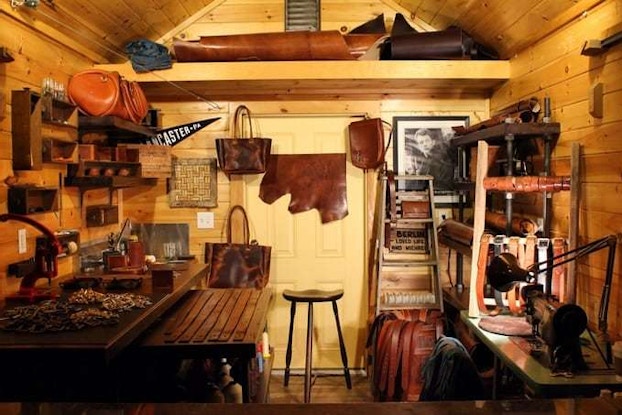
John Michael Glick thought he’d found his calling.
He thought that working in politics was his passion.
But after graduating from American University in Washington, D.C., and working for a New Jersey Congressman for two years, Glick felt trapped. Following another stint with a campaign organization in Pennsylvania, he left — vowing to never return to politics. Then, at 28 and while working at a construction company with his dad, Glick started dabbling with leather work — and he fell in love.
“For the first time in my life, I was lost in a project,” Glick said. “Time evaporated, the world around me ceased to exist outside of what I created with leather. It felt like I was born to do this. I had finally found what I was missing.”
Glick knew that his grandfather had grown up Amish, but he didn’t know that leather craftsmanship was family legacy dating back many generations. Sitting by the fireplace with his grandfather one night, Glick learned about the family trade.
“My grandfather learned leather craft by the side of his father, as did his father before him,” Glick said. “The talent and skill of leather crafting passed from father to son for three generations, until my grandfather left the Amish church to explore his spirituality without constraint.”
He continued: “With my grandfather's separation from the Amish came the rift in our family’s leather crafting lineage.”
In January 2016, Glick dropped everything and committed himself to making leather goods full time. With a $5,000 loan from an Amish landlord, he opened his first workshop in the tourist town of Intercourse, Pennsylvania.
Fast forward two years, and Black Bear Leather has found a retail home at the popular Eastern Market in Washington’s Capitol Hill neighborhood, where he sells the wallets, belts, bags and other wares he makes at his Pennsylvania shop. And the response has been tremendous. The company is expecting more than $100,000 in sales this year and has hired a part time apprentice.
Following the launch of his company’s Kickstarter crowdfunding campaign, we asked Glick about his journey and what three nuggets of wisdom he would offer to other entrepreneurs. Here’s what he told us.
- Improvise. “Cash flow can be pretty tight during the winter months, because some of our sales die off. One time, I purchased a large order of leather that I couldn’t use for the products that I bought it for. It was just sitting there. It was wasted capital. Ultimately, I found a way to take that leather that I couldn’t use and decided to create something new that I could sell, and recoup my cash flow.”
- Focus on quality. “We make 100% American-made, long-lasting leather products that can be handed down as legacy pieces. We use American-made vegetable tanned leather. This leather is highly environmentally regulated, and we work with one of only three vegetable tanning facilities remaining in the U.S. At the end of the day, it’s a win-win all around: American-made leather, American jobs and a responsibly made product from start to finish.”
- Work with good people. “One of the big benefits of being a leather worker in Lancaster is that the Amish community is a very substantial leather working community still because they need all the leather work for their horses and buggies. So there’s a relatively large number of leather shops in Lancaster that sell hardware, tools [and] leather."
"For the Kickstarter project that we’re doing, I teamed up with a young local guy who has a shop and he’s using a classic sewing machine to stitch the larger seams on our bag. It’s nice that we can team up with the Amish community and be more productive,” he said.
CO— aims to bring you inspiration from leading respected experts. However, before making any business decision, you should consult a professional who can advise you based on your individual situation.
CO—is committed to helping you start, run and grow your small business. Learn more about the benefits of small business membership in the U.S. Chamber of Commerce, here.









